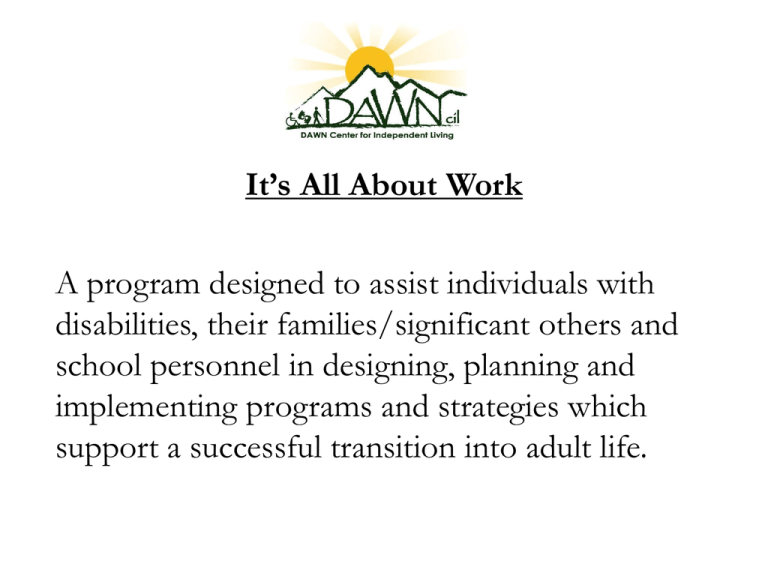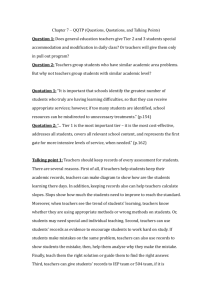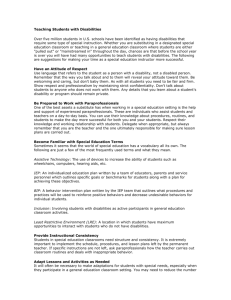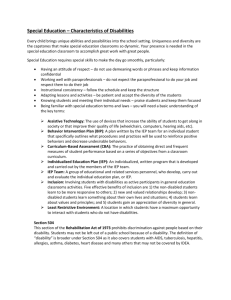It’s All About Work A program designed to assist individuals with
advertisement

It’s All About Work A program designed to assist individuals with disabilities, their families/significant others and school personnel in designing, planning and implementing programs and strategies which support a successful transition into adult life. It’s All About Work - Benefits • A statewide pilot project designed by the NJ Association of Centers for Independent Living in partnership with NJDVRS and NJDOE • Curriculum incorporates materials to assist schools in meeting the Core Curriculum Standards and IEP requirements for transition to adult life planning at 14 and 16. • The strengths based profile which is an outcome of participation in the program will assist in helping develop transition goals and objectives. • Participants will be able to access services through DVRS prior to graduation. • Centers for Independent Living assist individuals of all ages and students will have a constant as they transition from school to adult life. What is Transition Planning? Transition is the process that prepares students for life after high school. For students aged 14 and above the term “transition services” means a coordinated set of activities for a child with a disability that: a) is designed to be a results-oriented process focusing on easing the child’s movement from school to post-school activities. b) is based on the individual child’s needs, taking into account the child’s strengths, preferences, and interests. What is Transition Planning? Cont’d c) includes instruction (the use of formal techniques to impart knowledge), related services (transportation, developmental, corrective, and other supportive services), employment (services that lead to a job or career), community experiences (services provided outside of the school in community settings by schools or other agencies), post-school adult living, daily living skills (if appropriate), functional vocational evaluation (assessment that provides information about job or career interests, aptitudes and skills). Why is Transition Planning Important? • Transition into the adult world can present challenges for all young people however, the process of transition may be more difficult for some youth with disabilities and will require unique strategies to enable each student to achieve the maximum possible independence in working, living and participating in the community as adults. • The Transition plan provides a roadmap for the students life after high school. • Without this “roadmap" it is very difficult for a student to achieve his/her highest level of independence. • The educational system is based on entitlement. • The adult service system is based on eligibility. Transition and the IEP Beginning not later than the first IEP to be in effect when the child turns 16, or younger if determined appropriate by the IEP Team, and updated annually, thereafter, the IEP must include— • (1) Appropriate measurable postsecondary goals based upon age appropriate transition assessments related to training, education, employment, and, where appropriate, independent living skills; and • (2) The transition services (including courses of study) needed to assist the child in reaching those goals. [§300.320(b)] • This means that the IEP team must develop measurable goals for the student that are focused on the postsecondary world and specify what transition services are needed to help the student reach those goals. Things to consider/discuss • • • • • • • • • Postsecondary Education, Vocational Education, Integrated Employment (including supported employment), Continuing and Adult Education, Adult Services, Independent Living Community Participation. Guardianship Estate Planning • Helpful Tip • • Create a timeline/checklist for your plan Prioritize what’s most important. Transitioning to Adult Life requires the following skill sets: • • • • Ability to gather and assess information for making sound decisions Applying a decision-making process to career and lifestyle preferences Planning and problem-solving in daily life Learning how to access and thrive in an independent living environment • Identify and obtain needed systems of support • Gain access to and utilize technology to enhance independence, as needed It’s all About work includes 3 Levels of Coursework related to Transitioning to Adult Life Tier 1: A coursed designed to assist high school students with disabilities (ages 14 and up) to begin identifying their future goals and planning for life after school. Tier 2: A course designed to assist high school students with disabilities (ages 17 and up) in identifying career preferences, explore the world of work and learn about the adult service system. Tier 3: A course designed to assist adults with disabilities in identifying and pursuing their employment/ life goals. Tier 1 - Planning for Adult Life: An Introductory Course • Targeted to high school students with disabilities ages 14 and up • An 8 session course (45 to 60 minutes per session) • Maximum of 12 Students per course Course focuses on: • Understanding the Importance of Interpersonal and Social Skills • Development of a Strength Based Student Transition Profile • As Applicable, Referral to DVRS (Students 16 and over) Tier 2 - Planning for Adult Life: • Targeted to high school students with disabilities ages 17 and up • A 10 session course (45 to 60 minutes per session) • Maximum of 12 Students per course Course focuses on: • Interests/Aptitudes/Learning Style Profiles and Inventories • Understanding and Preparing for the World of Work • Consideration and Exploration of Post Secondary Educational Opportunities • Independent Living Skills • Goal Planning for Adult Life • Development of a Strength Based Student Transition Profile • As Applicable, Referral to DVRS Tier 3 - Planning For Adult Life: For Non-Transitioning Adults • Targeted to adults with disabilities who are out of high school. • A 10 session course ( 1 hour sessions) • 8 to 12 students per course • Community/CIL based • Strength Based Profile/Portfolio inclusive of assessment results • Interests/Aptitudes/Learning Style Inventories • Understanding and Preparing for the World of Work • Independent Living Skills • Adult Systems of Support • As Applicable, referral to DVRS Strengths Based Student Profile Learning Style Strengths and Abilities at: Home School Community Interests and Activities at: Home School Community Preferences Employment/Vocational Hopes and Dreams Job preferences Courses needed to achieve career goals Work History Preferred characteristics of a job. Support Systems and Accommodations Supervision needs Components of a Successful Transition and the Parents Role. • • • • Encourage your child to make age-appropriate decisions and choices as early as possible. It is also important to allow him or her to make mistakes. Transition is a lifelong process. Planning for your child’s future must begin as early as possible. The “entitlements” that exist while your child is in school will end as soon as he or she graduates or ages out of the education system. As an adult, your child will have to apply and be found “eligible” for some services. You and your child should be as familiar as possible with agencies and organizations that can provide necessary services. There will be agencies and entities, other than your child’s school, involved in your child’s plan. Remember, though, that there are no programs that can provide all of the services and supports needed by every individual. Components of a Successful Transition and the Parents Role. • • • Combine the information and guidance agencies provide along with your knowledge to make informed choices with your child. Although, do not assume that the professionals always know what is best for your child. Do not assume that because your child has a disability there will always be a program to meet his or her needs, or that there will always be a professional to make decisions. Utilize your community-based network (friends, family, religious organizations) NJ State Resources NJ Department of Education – Office of Special Education: http://www.state.nj.us/education/specialed/ – Special Education resources • http://www.state.nj.us/education/specialed/resources/ NJ Department of Human Services (DDD, DDS, CBVI, DDHH, DMHS) – – – – http://www.nj.gov/humanservices/clients/disability/ http://www.nj.gov/humanservices/ddd/home/index.html http://www.nj.gov/humanservices/dds/home/index.html Resource Manual • http://www.nj.gov/humanservices/dds/documents/RD13webqxd.pdf NJ Department of Children and Families • http://www.state.nj.us/dcf/ – Children's System of Care • http://www.state.nj.us/dcf/providers/csc/ Parent Education Resources SPAN- Statewide Parent Advocacy Network http://www.spanadvocacy.org/ Wrightslaw: http://www.wrightslaw.com/ NCSET National Center on Secondary Education & Transition http://www.ncset.org/default.asp PACER Center - http://www.pacer.org/ National Center for Learning Disabilities http://www.ncld.org/ Autism Speaks – http://www.autismspeaks.org Autism Now - http://autismnow.org/ The Boggs Center http://rwjms.rutgers.edu/departments_institutes/boggscenter/ Local and Other Resources Center for Independent Living (Morris, Sussex and Warren) – www.dawncil.org NJ Statewide Independent Living Council – http://www.njsilc.org/ PATH – Parent Action Transition Handbook – http://www.njsilc.org/sites/default/files/path%20handbook%20e.pdf Transportation Morris county paratransit system http://www.morrishumanservices.org/adv/MAPSRegistration.pdf Access Link http://www.njtransit.com/tm/tm_servlet.srv?hdnPageAction=AccessLinkTo Local and Other Resources Center for Independent Living (Morris, Sussex and Warren) – www.dawncil.org NJ Statewide Independent Living Council – http://www.njsilc.org/ PATH – Parent Action Transition Handbook – http://www.njsilc.org/sites/default/files/path%20handbook%20e.pdf Transportation Morris county paratransit system http://www.morrishumanservices.org/adv/MAPSRegistration.pdf Access Link http://www.njtransit.com/tm/tm_servlet.srv?hdnPageAction=AccessLinkTo Questions? Carmela Slivinski, Executive Director DAWN Center for Independent Living, Inc 30 Broad Street, Suite 5 Denville, NJ 07834 973-625-1940 1-888-383-DAWN




